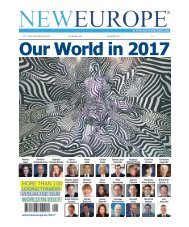OUR WORLD - Perspectives on Artificial Intelligence
You also want an ePaper? Increase the reach of your titles
YUMPU automatically turns print PDFs into web optimized ePapers that Google loves.
Editor’s Letter<br />
A<br />
few m<strong>on</strong>ths back, while preparing a workshop <strong>on</strong> gender stereotypes and biases, I came<br />
across research by the World Ec<strong>on</strong>omic Forum suggesting a significant gender<br />
gap am<strong>on</strong>g AI professi<strong>on</strong>als, with <strong>on</strong>ly 22% of AI professi<strong>on</strong>als globally being female,<br />
compared to 78% being male. Perhaps I was expecting it, but I still found it not just disturbing;<br />
more than that. I thought it’s dangerous and I’ll explain why right away.<br />
By Jerry Zagoritis<br />
Editor and<br />
Publishing Partner<br />
of Our World,<br />
and the CEO of<br />
Campaign Lab<br />
An algorithm that has been coded by humans, may reflect biases of the developers. If the<br />
data collected and used for the development of AI is gender biased, the results will also be<br />
biased, leading as a c<strong>on</strong>sequence to biased decisi<strong>on</strong>s in a number of fields, including for<br />
example hiring decisi<strong>on</strong>s.<br />
And so I’d like to use this editorial as an opportunity to raise the attenti<strong>on</strong> of the business<br />
leaders and policy makers hosted in our pages to this simple fact: to avoid the replicati<strong>on</strong> of<br />
stereotypes and biases, and to enhance AI’s efficacy, we must urgently promote more diversity,<br />
including the participati<strong>on</strong> of more women, in the development of AI.<br />
Back to O/W. In the development of this editi<strong>on</strong> we invited authors who share our visi<strong>on</strong> that<br />
our world needs inspirati<strong>on</strong>, passi<strong>on</strong> and boldness for a better tomorrow.<br />
This is why we invited the Transport Commissi<strong>on</strong>er, Adina Valean, and the Greek Minister<br />
for Digital, Kyriakos Pierrakakis, to foreword this special editi<strong>on</strong>. Mr Pierrakakis has inspired<br />
change and has helped his (our) country take unprecedented digital leaps forward, while Ms.<br />
Valean is no stranger to the readers of this magazine - she has repeatedly c<strong>on</strong>tributed her<br />
always inspiring thoughts to O/W editi<strong>on</strong>s over the years.<br />
The topic of <strong>Artificial</strong> <strong>Intelligence</strong> can be divisive by nature; as are most things novel. With that<br />
in mind we are excited to be hosting representatives of the European Parliament’s Special<br />
Committee <strong>on</strong> <strong>Artificial</strong> <strong>Intelligence</strong> in a Digital Age (AIDA) from all political groups, except<br />
<strong>on</strong>e* – including the AIDA Committee Chair and the European Parliament Rapporteur. EU<br />
Policy makers who, next to important business leaders, nati<strong>on</strong>al policymakers and thinkers,<br />
c<strong>on</strong>tribute to what we see as an exciting debate <strong>on</strong> the present and future of our world.<br />
Happy Holidays and a Happy New Year!<br />
*We made sure to invite Members of European Parliament from all political groups in order to foster<br />
a fair and balanced debate. Unfortunately, we didn’t receive a resp<strong>on</strong>se from the GUE/NGL (European<br />
United Left) Member of AIDA, although our team called and followed up by email repeatedly.










